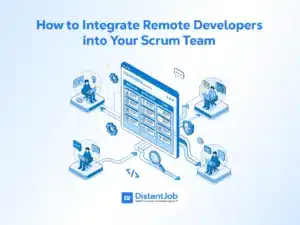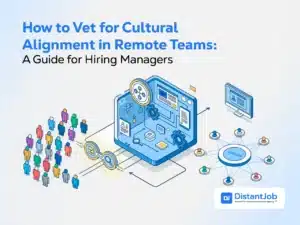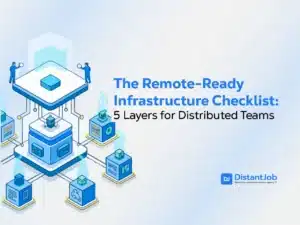Running a remote company means dealing with offboarding protocols. An employee can leave for many reasons, from voluntary resignation to termination or retirement. More importantly, the way an employee leaves a remote company can impact the team structure and productivity. For this reason, targeted exit interviews can help you understand what didn’t work, and improve where your company could have been better. As a remote manager, it is important to have an employee ‘Separation Checklist’ in your remote work policy to end your professional relationships on a positive note.
So, let’s start having a look at a sample of exit interview questions and the best practices to improve your remote work environment:
Top Exit Interview Questions to Ask in 2025
What to ask in an exit interview depends on the role and, more importantly, on how the relationship is ending. Did they decide to quit suddenly or were they having problems with a team member? Did they get a better job offer?
When an employee leaves during a busy moment, or when employees are not reliable on their tasks overwhelming other team members, it can impact your whole team productivity and wellbeing. To avoid delays, it is essential to learn each time, and improve your practices to ensure not only a healthy remote work environment but also an easy and quicker onboarding process.
Here are common exit interview questions to gather new data and improve your team dynamics and remote workplaces:
Job Satisfaction and Role:
- How clearly were your job responsibilities defined?
- How was the onboarding process in a remote environment? What would you improve?
- Did you feel your skills were valued and adapted to the given tasks?
- Did you feel your role required too many repetitive tasks or did you have the possibility of improving and expanding your potential?
- Was the team supportive and available?
- Was the remote environment impacting the relationship with your team?
- On a scale of 1-10, how satisfied were you with your work and the workplace?
Company Culture and Environment:
- Did you feel our company culture supported remote work effectively?
- How would you rate the communication and collaboration tools provided?
- Was the company encouraging diversity and inclusion among the team?
- Did the company provide enough initiatives and events for different departments to meet each other?
- Was the management present to provide a final revenue of the company and recognise different contributions?
Career Development:
- Were there sufficient opportunities for career advancement and skill development within the company?
- How does the company facilitate creating a productive work environment, for example covering co-working spaces for remote employees, providing additional tools on request (Headphones, double screen, etc.), or software (SEO software, marketing tools, etc.)?
- How effectively did the company facilitate remote learning and professional growth?
- Were learning team initiatives like training or innovation courses provided?
- Was it possible for you to attend fairs or specific events on behalf of the company to expand your network and do market research?
Career questions for remote developers:
- As a developer, were previous databases and digital infrastructures accessible and available?
- Were the technologies and remote processes you used adequate for the tasks? How would you improve it?
- How would you describe the communication process among different development teams? How would you improve it?
- Were you supported enough with additional temporary stuff during the production phase or to fix bags and issues to keep up with the company’s objectives?
- Was it easy or hard to introduce temporary staff during the production phase?
- Was the management department open to changes based on your feedback and request?
- Could you leave a clear and accessible digital infrastructure for the next candidate? How would you improve the protocol to make it more accessible for other developers and scale the company?
Management and Support:
- How would you describe the support provided by management for remote employees?
- Were your contributions recognized adequately, and how could recognition practices be improved among the team?
- Were there enough communication channels to ask questions, share updates, and receive feedback?
- Was the management department facilitating communication among different departments with the right remote tools?
Work-Life Balance:
- Did you find the company’s work-from-home policies conducive to a healthy work-life balance?
- What improvements could be made to support better balance for remote workers?
- How hard was it for you to set a schedule and switch off after a day shift because of remote communication channels? If yes, how could this be improved?
- Did you feel that different time zones were making it harder for you to set a healthy schedule?
Exit Specifics:
- What prompted your decision to leave?
- Do you think you receive a fair salary during your employment?
- Under what circumstances, if any, would you consider returning to the company?
How to Conduct Exit Interviews Effectively
To conduct exit interviews effectively in both remote and in-office settings, schedule a private, comfortable conversation (via video call or face-to-face) during the employee’s final week. Start by explaining why you are conducting the interview. It’s important to send an email illustrating what to expect from the meeting, explaining you want to finalize the last practical details and are looking for constructive feedback. Clearly explain confidentiality, use standardized questions for consistency, and actively listen with empathy.
This last interview is a tool for improving your company, and it’s essential to give space to your leaving employees and create an open environment for them to talk and make criticisms if they have to.
Let’s have a look at the best practices for exit interviews starting with the most common challenges in a remote company.
Challenges and Best Practices for Remote Exit Interviews and Offboarding:
1. Communication delays
Most remote companies have employees distributed across the globe, with different time zones and work schedules. While you can ensure 24/7 service for your company, it can be a challenge to coordinate meetings and make final decisions because of missed or delayed responses. These delays can lead to misunderstandings and slow down the whole offboarding process.
-> Solution: Communicate clearly
As obvious as it sounds, communicating clearly is the only solution and it is up to you as a manager.
For example, you can create a separate channel (when you have enough notice) with the leaving employee, HR and legal parties for specific questions and updates. So, your employee will know in advance who to contact and you can ensure a shared communication between all interested parties.
Furthermore, consider making an agreement and keep some working accounts, such as email or payroll software, active for an additional 3 months after the termination date. So, if you or your employee need additional documents, you both have a safe channel to communicate and can easily access what you need.
Setting clear timelines and layout different exit phases with clear communication channels is the first step to ensure a smooth offboarding process.
2. Physical asset retrieval
The second challenge in remote environments is collecting company-owned items. From laptops to mobile devices to company bank cards, it is essential to make sure these assets are returned in good condition to protect your data – and budget.
-> Solution: Leverage technology
To facilitate the process, you can arrange a day with the leaving employee to return all the technology items, making a proper list with models and accessories for both parties.
One of the best ways is to pay a courier delivery to pick up the items wherever your employee is located, so you will know exactly when the items will be back to be checked and repurposed. For bank or SIM cards, you can stop them online and notify the end of service to the employee.
The point here is not how much you trust your employee but to arrange a process that is clear for everyone in the team so that the onboarding for the new candidate is better organized.
3. Work transition dynamics
Work handovers with remote employees can be tricky, especially in development teams. As a remote company working on different time zones, you must ensure functional communication methods and clear documentation to avoid a drop in productivity for your team.
-> Solution: Establish handover protocols
Especially to improve future onboarding, it is important to create solid protocols for remote handovers, which include clear documentation for technical processes, communication channels, legal matters, etc. Setting these types of protocols will help you smoothing the transition with new candidates without stressing your existing team.
4. Data security concerns
Finally, data security is an essential element for any company, even more in a remote setting. It is important to coordinate with your existing team to make a checklist of software and accounts to see which one needs to be closed to avoid potential issues during the offboarding process.
For example, many companies have problems when developers leave because coding scripts change fast, and new employees don’t have the right passwords or cannot access the previous databases. These roadblocks not only impact your team’s productivity but also your company budget.
-> Solution: Establish data security protocols
As for work tasks, it is important to have a separated checklist for revoking access to company systems, applications, and accounts. You must clearly communicate to the employee when access to your company systems will be closed, making an exception only if your current team needs the leaving employee still available. However, you must clearly state when the access will be stopped and the importance of maintaining legal and security compliance to prevent potential disputes or breaches.
Final Tips for your Exit Interviews and Offboarding Practices in a Remote Work Environment:
- Coordinate with other departments: An exit interview requires the participation of different departments, from your existing team, to HR and legal. For this reason, it is important to create shared communication channels to track the process and have everyone on the same page.
- Acknowledge your employee’s contributions: Unless the work relationship is ending with an argument, it is important to acknowledge your employee’s contributions to reinforce your company culture and leave on a positive note.
- Offer future support: On the same line, if your employee worked hard for you, offer future help like reference letters or networking opportunities, showing more appreciation for the job one.
- Action feedback: Collect data from your exit interview with an open mind, understanding which feedback can truly improve your company and support your employees’ work.
Conclusion
Some work relationships, as much as in love, weren’t just meant to work, and there is nothing you or your employee could have done. But most of the time, there is a lot you can learn for your company. More importantly, you can understand better what you want from your employees and make changes at the very start, during the hiring process.
Selecting the right candidate in a remote market is challenging, not only for the bigger talent pool. Spotting the right personality among different candidates can be challenging through remote tools. So, if you need help to improve your hiring process and make your exit interviews easier in the future, we are here to help. We can help you find the right candidate for your team and support you with their remote contract and communication, just let us know what you need!





